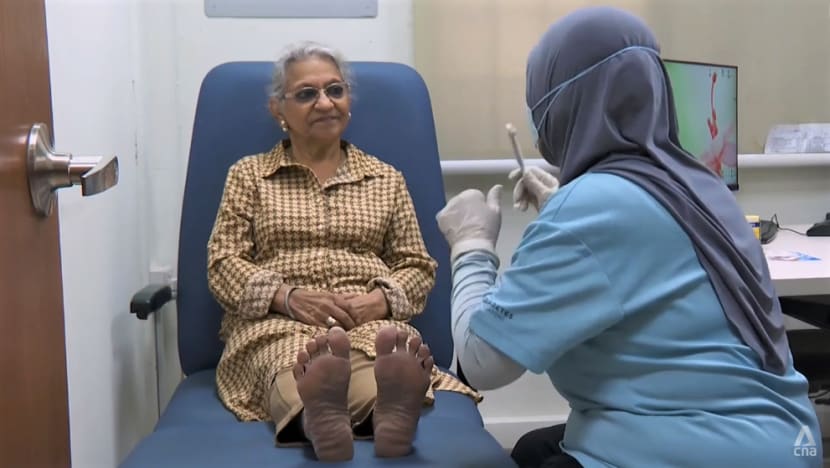Diabetes screenings to play a big role in Singapore, with 1 in 3 people at risk of the disease
Since Singapore declared a "war on diabetes" in 2016, medical practitioners have reported an increase in the number of people getting screened.

Ms Daljit Kaur, a diabetes nurse educator, is attended to by a medical practitioner. (Photo: CNA screengrab)
SINGAPORE: Two years ago, at a health screening that she went to by chance, Ms Daljit Kaur found out she had diabetes.
The 79-year-old was not surprised by the diagnosis, given her family history and sweet tooth. But it was a wakeup call to watch her eating habits and take better care of her health.
“Although it wasn't like a shock, I knew it was time for me to pull myself up and start taking care … My lifestyle and the food that I take, I went low on my carbs and tried to go off sugar,” she said.
The early detection was a lifesaver, said Ms Kaur, adding that on top of medical help, she received advice on diet and lifestyle choices to prevent her condition from worsening.
Her experience spurred her to become a diabetes nurse educator as a way of giving back to the community.
"Because I have been inflicted by it, I would wish to share my knowledge with everybody else so that the rest get saved, get managed earlier, get diagnosed earlier. So that can prevent the complications of diabetes,” she said.
EARLY DETECTION IMPORTANT
Like Ms Kaur, more than 400,000 people in Singapore live with diabetes.
That figure could rise to 1 million by 2050 if nothing is done, said the Ministry of Health in June, noting that one in three Singaporeans is at risk of getting diabetes in their lifetime.
Healthcare practitioners said early screening done once every three years is key to detecting and mitigating the risks of diabetes-related complications, including kidney failure, heart attack, stroke and blindness.
“Diabetes is a silent disease and in the early stages, one can be totally asymptomatic until complications set in,” said Dr Vincent Chong, a family physician at Healthway Medical.
“Therefore, early detection is very paramount in diabetes because early treatment can retard progression of the disease and also prevent complications.”
He added that the chronic disease does not just affect individuals. It also has negative economic and social effects on the community and healthcare institutions.
“If the burden of diabetes gets out of control, our entire society will have to face the escalating healthcare costs, together with financial burden to the caregivers and their loved ones,” he said.
FREE SCREENINGS FOR SOME, FROM 2023
Screening looks set to be key in Singapore's preventive care strategy.
Healthier SG – a voluntary national primary care programme – will offer free Type 2 diabetes screenings for those aged 60 and above, when enrollment starts in the second half of 2023.
The free screenings - which also cover hypertension, hyperlipidaemia as well as breast, cervical, and colorectal cancer - will gradually be made available to those between 40 and 59 years old in the next two years.
The programme also includes more personalised care plans, which will benefit patients like Mr Lam Kum Cheng, who has kept his diabetes under control with support from his doctor.
"I'm taking the medication every day, the diabetes medication. And then I'm trying to avoid sweet stuff as well in my diet, and I'm also following some of the doctor's advice on dietary control, which is very helpful,” said Mr Lam.
INCREASED SCREENINGS SINCE "WAR ON DIABETES"
Singapore declared a "war on diabetes" in 2016, leading to a multi-pronged, nationwide response to tackle the disease.
Since then, medical practitioners have reported an increase in the number of people getting screened.
As a result, more cases are being discovered, including those with pre-diabetes – a warning sign of the likelihood of Type 2 diabetes in future.
Dr Chong said he has seen at least a 20 to 30 per cent increase in people getting screened for the disease, since Prime Minister Lee Hsien Loong’s 2017 National Day speech on fighting diabetes.
Charity organisation Diabetes Singapore said it has already conducted over 2,000 health screenings this year – more than double that of last year’s – due to outreach efforts and by working with partners such as religious communities and heartland associates.
Of these, around 10 to 15 per cent were detected to be cases of diabetes or pre-diabetes.
Detected cases are referred to their nearest general practitioners (GPs) for follow-up consultation.
“Before we (do) any screening, we find out which are the nearest GPs. We basically want them to go and see a doctor as soon as possible,” said Diabetes Singapore executive director Satyaprakash Tiwari.
The organisation also said that it strives for continuity in managing the condition, even after diagnosis.
It conducts regular checks on patients to ensure that any diabetes-related complications are detected in time – for instance, conducting eye exams at least once a year as vision loss is a common condition of the disease.
Diabetes Singapore said that while it sees many seniors, there is an “encouraging” uptick in the number of young adults getting screened.
The charity added that it is looking at novel ways to reach out to younger Singaporeans.














.png?itok=wrvZlVIP)





